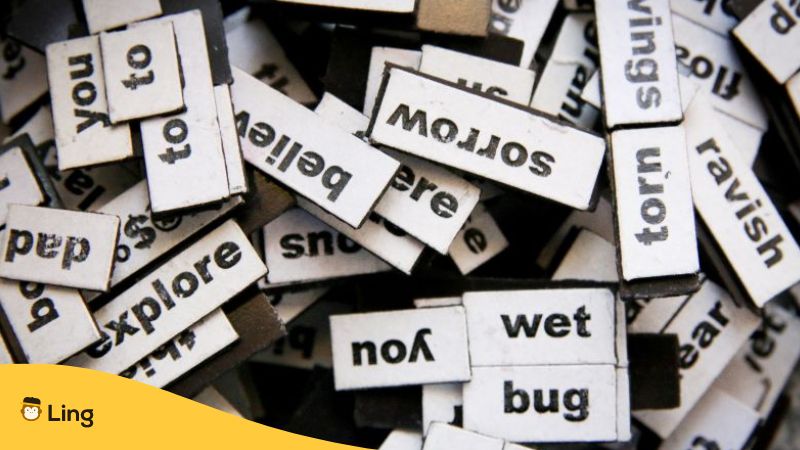Language is incredibly nuanced and stems from thousands of years of cultural influence & history. In today’s world with hundreds of modern languages, some words can sound silly or even nonsensical when taken from one language and spoken in another (especially in the English language!)
Every language has special words significant to that country’s culture and folklore passed down through generations. Even between dialects of the same language (for instance, Spain & Mexico), there are hundreds of discrepancies and ‘untranslatable’ words from place to place.
Today, we are looking at signature, outlandish, unusual words and their linguistic history & importance. These words are difficult to translate into a single English word, so we will look at their overall meanings & origins today.
Rhyming, inflections, false cognates, and silly syllable word sounds make this list as bizarre as it is. We’ll step back in time to discuss some of the weirdest words and their origins worldwide. Are you ready? Let’s learn!
20 Weird Words From Around The World

1. Snollygoster – USA
Try saying this word five times fast! ‘Snollygoster’ is a shrewd person, usually a corrupt politician, who does things for their own greedy motives.
The word may have derived from a half-reptile half-bird mythical creature called a ‘snallygaster’ from Maryland (but that is still to be determined). You’ll most likely hear this word while Congress is in session in the United States. It’s a big insult, so watch other people’s reactions to see them appalled!
2. Gluggaveður – Icelandic
Have you ever enjoyed a thunderstorm from the comfort of your home, listening to the world shake and watching lightning through the window? Well, the Icelandic word ‘gluggaveður’ means ‘window weather.’
It suggests that the weather is great because you are sheltered from the harsh reality of it! It’s similar to the Scandinavian concept of Hygge which we will also discuss in this article.
This concept applies to all types of weather—beautiful snowfalls, sunny days with harsh winds, or magnificent hailstorms. I love the Icelandic perception of enjoying the wonder & beauty of nature while curled up with a blanket and hot cocoa. It elicits such joy!
3. Hygge – Denmark & Norway
Scandinavian winters are cold, wet, and dark. People needed a way of flipping this narrative into cozy, warm, and restful; thus the lifestyle of Hygge was born. The definition of Hygge is a quality of being cozy and comfortable that gives a feeling of warmth and happiness. Like a hug!
Hygge means focusing on simple pleasures like snuggling under a blanket, lighting candles, or playing a board game by the fireplace. Taking the time to cultivate these practices will bring light into the harsh winters up north. Try to incorporate these slow-living practices in your life during wintertime and see how much it helps you!

4. Gezelligheid – The Netherlands
As Hygge is to Danish culture and Gluggaveður is to Icelandic culture, ‘Gezelligheid’ is to Dutch culture. This word is all heart, friendliness, and coziness. It’s like opening the door to your grandmother’s home as fresh cookies are baking in the oven. It’s warm, it’s familiar, it’s comfortable.
The root ‘gezel’ means friend or partner in Dutch. Gezelligheid can describe a place, person, memory, or anything or anyone that makes you feel at home.
Check out Best Dutch Movies & TV Series to watch while cozied up practicing gezelligheid.
5. Donnybrook – Ireland
Where does this funny word hail from? Back in the 1200s, the Donnybrook Fair in the town of Donnybrook (a district of Dublin) was infamous for its frequent brawls, heated debates, and rowdy behavior. Thus, the word ‘donnybrook’ was born! It is a noun meaning a heated quarrel or free-for-all fight.
6. Sobremesa – Spanish
‘Sobremesa’ (upon the table) is the Spanish custom of relaxing at the dinner table after a meal. Everyone is full, happy, and relaxed. The intimate atmosphere can last up to an hour or two as family members sip coffee, tea, and alcohol and even enjoy a cigar around the table. It is a lovely way to make the moment last and live slowly. All cultures should put sobremesa’ into practice!

7. Nincompoop – Britain
Now this one I’ve heard of … mainly in the elementary school courtyard! The word ‘nincompoop,’ meaning fool or idiot, has an interesting origin story. The word seems to come from the Latin legal phrase ‘non compos mentis’ meaning mentally incompetent (though this is up for debate among etymologists!) There are many weird English words, but this tops the list!
No matter its origin, the word ‘nincompoop’ is still regularly used in modern-day Britain. Although instead of a scathing insult, it’s more of a teasing term among friends. Kids especially love this word … I wonder why? 🙂
8. Tsundoku (積読) – Japanese
This Japanese word calls out all those book lovers who keep buying more books without reading the others. The intention to read the books is there, but the end result is not. The phenomenon of actively piling up books is super common, and, interestingly, the Japanese have one slang word for it!
Fun fact: The word ‘tsundoku’ has the same meaning as another weird word: bibliophobia. The ‘phobia’ in the word is the fear of running out of books to read!
9. Ya’aburnee ( يعبورني ) Arabic
Romantic yet morbid, ‘ya’aburnee’ translates to ‘you bury me’ in English. It’s when you love someone so much that you can’t imagine living without them, so you wish to die before them.
Read Many Ways To Say I Love You In Arabic to learn similar phrases to ya’aburnee.

10. Verschlimmbessern – German
A common plot point in comedy, ‘verschlimmbessern’ is an extremely long German word that translates ‘to make a situation worse through an honest attempt’. You try so hard to fix a situation and have good intentions, but you accidentally put more gasoline on the fire. We’ve all been there!
11. Yaourter – French
Usually, Frenchmen make fun of foreigners who cannot speak French, but this word means quite the opposite! The French term for gibberish, the word ‘yaourter’ refers explicitly to someone butchering a foreign language in song. Often the singers mishear the lyrics and mess it up so badly that it’s pretty comical.
The French are finally admitting that it’s hard learning another language! So be careful next time you’re at karaoke with a French person, you don’t want to risk being insulted by the term ‘yaourter!’
12. Aranyhíd – Hungary
Descriptive and alluring, the word ‘aranyhíd’ literally translates to golden bridge. It describes the gleaming reflection of the sun on the water around the bridge as it rises or sets. How beautiful!
Fun fact: The Hungarian language has a different word to describe the reflection of the moonlight on water … Can you guess what it’s called? The silver bridge, or “ezüsthíd” in Hungarian.
The images these words conjure are stunning, expressive, and unique. I wish there were more words like this in English!

13. Akihi – Hawai’ian
The native language of the stunning islands of Hawaii in the United States, the word ‘akihi’ refers to spacing out, or being removed from reality. Its meaning is comical rather than annoying, following the relaxed, laid-back Hawaiian culture.
Remember in school when your teacher would tell you the directions for the assignment and you’d immediately forget them? That is ‘akihi.’ It happens to all of us (some more than others!)
14. Toodle Pip – United Kingdom
Toodle pip sounds like an expensive dog breed, but it’s actually a parting phrase similar to ‘cheerio’ used in the United Kingdom. The goodbye phrase is nonsense, outlandish, and insanely proper, which is why it’s so funny & strange!
The origin is from the 20th century, with some experts saying it’s a slight alteration to the French ‘see you soon’ (à tout à l’heure). A similar goodbye is ‘toodle-oo,’ though I don’t know if you’d hear a young person say this.
Why all the ‘toodles?’ The term ‘toodle’ means the noise of a bell signaling departure. Thus, toodle was interwoven with common departure expressions in English!
15. Age-otori 上あげ劣おとり- Japanese
The Japanese have countless funny words for unfortunate events of the human experience. This specific word, age-otori, means to look worse after a haircut.
You go into the hairdresser so hopeful for good grooming, then are supremely knocked down when you look in the mirror afterward. Unfortunately, this incident occurs for many people, and now you have a weird word for it!
16. Backpfeifengesicht – German
I think we’ve found it … the perfect word! Has someone ever gotten under your skin so much that you just want to slap their face whenever they’re talking to shut them up? The Germans know this feeling and even have a word for it! ‘Backpfeifengesicht’ translates to ‘a face that needs a slap.’
A face that needs a slap. Lol! Don’t say the Germans show no emotion. Just look at all the colorful weird words they have for when emotions are high!

17. Saudade – Portuguese
One of the most famous words on this list, ‘saudade’ is a Portuguese word for an intense aching of the past. Usually talking about a lost love, this feeling of nostalgia, longing, and melancholy has been the inspiration for many Brazilian poems, songs, and novels.
This word and the emotions it elicits are a source of Brazilian pride. There is even a holiday, the Day of Saudade, celebrated every year on January 30th. Talk about how words & language can have an impact!
18. Kaizen 改善 – Japanese
Though you may have noted this term in your western corporate office, it originates from the Japanese language, meaning ‘change for the better.’ Kaizen is a compound word stemming from ‘kai’ meaning ‘change’, and ‘zen’ meaning ‘good’.
It is a philosophy of continual improvement in businesses and has been adopted by many famous companies like Toyota.
It is interesting how this Japanese philosophy has inspired western business structures. Words have definitions, philosophies, and interpretations that exist far wider than you would ever think.
19. Wabbit – Scotland
No, not the long-eared, furry-tailed animal! ‘Wabbit’ was first popularized in Scotland as a slang word to mean ‘worn out’ or ‘bone-tired.’ It is an adjective and used to describe feeling tired.
Example: I felt the most wabbit after school, so I went to lie down in my bed.
Silly, right?
20. Xertz – English Language
Our final word describes something I know every single person has done at some point in their life. Imagine it’s a horribly hot day, and you’re lethargic, cranky, and thirsty. The sidewalk is sizzling, and the sun is scorching down as you sweat and sweat.
Our word ‘xertz’ is the activity of grabbing a cool drink like lemonade or iced tea and guzzling it down in big gulps. That feeling of relief is powerful! Thus why there is a word that relates it. Man, I could use a cool drink right about now!

Which Weird Word Was Your Favorite?
Are you already deciding how to incorporate the new vocabulary you’ve learned, such as ‘backpfeifengesicht,’ ‘donnybrook,’ or ‘wabbit’ into the daily conversation? This weird word list is so much fun to play around with, especially when you know its origin!
Notice what countries top this list … Japan, Germany, and Britain. Are these the countries you most expected to have the strangest words?
Do you want to learn more about these languages but need help knowing where to start? Try out the Ling App, a user-friendly language learning app with proven features to help you learn(+ understand) a new language.
You can download it for free on the App Store and Play Store.

Want more exciting articles about worldwide languages? Check out Silly French Idioms & Most Beautiful Festivals Worldwide.
Welcome to the weird and wonderful world of languages. If you’re keen on learning some cool-sounding, strange, funny, silly, and downright outrageously hard to pronounce words, you’re in the right place. We’ve rounded up some of the weirdest words in the world!
Did You Know
Here’s a quick fact about languages: they’re all shaped by geography, by people’s experience, and by culture. And for that reason, every region has its own unique set of idioms and memorable phrases.
Non-English phrases that sound like weird words to you have deep meaning for someone from another culture. Conversely, some English words sound utterly senseless to them.
Many foreign languages contain weird words describing complex actions or emotions, and they have no English language equivalents. Others are straight out of the English dictionary, but they remain largely unheard of.
Roundup of the Weirdest Words From Around the Globe!
Toska
Vladimir Nabokov said that no English word renders all the shades of the Russian word “toska,” and he was right. At its deepest, the term refers to a sensation of spiritual anguish. It can also refer to a dull headache of the soul, mental throes, or missing something you don’t even know. It can also be a feeling of nostalgia, lovesickness, and even boredom.
Jayus
Jayus is an Indonesian word that is used when a joke is so badly told and so utterly unfunny that one has no other choice but to laugh.
Litost
This Czech word was pinned by Milan Kundera, author of The Unbearable Lightness of Being. It relates to a state of agony and torment created by the sudden realization of one’s own misery.
Kyoikumama
In Japanese, Kyoikymama refers to a mother that relentlessly pushed her children toward academic achievement.
Tartle
In Scotland, Tarle refers to the act of hesitating while you’re introducing someone because you’ve actually forgotten their name.
Ilunga
In Southwest Congo, Ilunga (which is a word from the Tshiluba language) is one of the most famous untranslatable words. Most professional translators translate it as the stature of a person that’s ready to forgive and forget any kind of abuse, tolerate it once more, but who will never forgive or tolerate a third offense.
Wabi-Sabi
Wabi-Sabi is a Japanese phrase that roughly translated to a way of living that focuses on finding the beauty within life’s imperfections and peacefully accepting the natural cycle of decay and growth in life.
Schadenfreude
Schadenfreude is a German word that describes the feelings of pleasure one gets by seeing another’s misfortune. It’s a lot like “America’s Funniest Home Videos,” but Schadenfreude probably just didn’t have the same ring to it.
Hyggelig
Hyggelig is a Danish word that translates to connotations of a warm, friendly, cozy demeanor, but that’s just when it’s literally translated. The true meaning of the word is something that just has to be experienced to be understood.
L’appel du vide
In French, this means “the call of the void”. Of course, that’s when it’s translated literally to English. But more specifically, the French use this phrase to describe the instinctive urge for jumping from high places.
Ya’aburnee
Ya’aburnee is an Arabic word that’s both morbid and beautiful at the same time. It means “you bury me”. In Arabic, they use it as a declaration of hope that you’ll die before someone you love because it would be too difficult to live without them.
Duende
Originally used to describe a mythical entity that possesses humans and creates a feeling of awe in nature, this Spanish term’s meaning has morphed into something more that now refers to the mysterious power a work of art can have on a person.
Saudade
Saudade is one of the most beautiful Portuguese words of all time. Whether it’s translatable or not, it describes the feeling of longing for something or someone that you love deeply. But you lost that thing or person. Bittersweet memories are all you have left.
Παλικάρι (Palikári)
You can’t translate this Greek word. But it describes a brave and proud young man. The word is actually a noun that they use to describe the characteristics of a fearless young man. The word emerged during the Greek War of Independence between 1821 and 1829. In those times, a παλικάρι (palikári) fought in a group led by a captain.
Cabotage
Cabotage is a fancy word for coastal navigation. It’s also the exclusive right of a country to control the air traffic within its borders. There’s an ongoing debate about the origins of the word. What we do know is that it was popularized in the mid-19th century. It’s probably also a conjugation of the French language word “caboter” (sail along a coast) and the Spanish language word “cabo” (cape, headland).
Gardyloo
Gardyloo was used in medieval Edinburgh as a warning cry. Back then, it was customary to throw slops from the windows into the streets.
Valetudinarian
A valetudinarian is a sickly or weak person. It also describes someone that is morbidly concerned with his or her health.
Mamihlapinatapei
This is a Yagan word, and Yagan is the indigenous language of the Tierra del Fuego. It’s beautiful and describes the feeling of butterflies in one word. The meaning? The wordless but meaningful look two people share when they both want to initiate something but are both reluctant to start.
Torschlusspanik
Torschlusspanik is a word that belongs to the German language. When you translate it literally, it means “gate-closing panic”. Contextually, however, it refers to the fear of diminishing opportunities as one ages. We think it’s one of the weirdest words to describe a midlife crisis.
Conclusion
The world is home to many fascinating languages, each with its own set of intriguing phrases and idioms. We’ve shared some of the weirdest words and most captivating phrases from around the world with you so you can delve a little deeper into the magical world of linguistics.
For more informative articles and language learning tips, be sure to check out our blog!

By
Last updated:
January 7, 2023
Learning English is not always easy. English is especially known for having a crazy vocabulary that can make things tricky for learners.
Even if you’ve mastered all the important grammar rules, slang words and idioms, weird English words come along and can still leave you feeling a bit confused!
Lucky for you, this post will introduce you to 15 weird English words that you should know!
Contents
- 1. Kerfuffle (kəˈfʌf(ə)l)
- 2. Hullaballoo (ˌhʌl.ə.bəˈluː)
- 3. Cacophony (kəˈkɒf(ə)ni)
- 4. Ragamuffin (ˈraɡəmʌfɪn)
- 5. Whippersnapper (ˈwɪpəsnapə)
- 6. Gobbledygook (ˈɡɒb(ə)ldɪˌɡuːk)
- 7. Gibberish (ˈdʒɪb(ə)rɪʃ)
- 8. Poppycock (ˈpɒpɪkɒk)
- 9. Discombobulate (ˌdɪskəmˈbɒbjʊleɪt)
- 10. Flummox (ˈflʌməks)
- 11. Curmudgeon (kəːˈmʌdʒ(ə)n)
- 12. Lackadaisical (ˌlakəˈdeɪzɪk(ə)l)
- 13. Woebegone (ˈwəʊbɪɡɒn)
- 14. Lollygag (ˈlɒlɪɡaɡ)
- 15. Frankenfood (ˈfraŋk(ə)nfuːd)
Download:
This blog post is available as a convenient and portable PDF that you
can take anywhere.
Click here to get a copy. (Download)
1. Kerfuffle (kəˈfʌf(ə)l)
Kerfuffle (noun) has been around since the early 1800s and probably came from either Scottish Gaelic or from Celtic Irish, the languages that were used historically in Scotland and Ireland.
It means to make a fuss or a bother, usually when people have different points of view.
What’s all the shouting for? Why are you making such a kerfuffle?
2. Hullaballoo (ˌhʌl.ə.bəˈluː)
“Did you hear all that hullaballoo in the office today?”
A word that really sounds like what it means, hullaballoo (noun) is the loud noises and shouting that people make when they’re angry.
It’s been part of the English language since the middle of the 18th century.
3. Cacophony (kəˈkɒf(ə)ni)
Another word related to noise, a cacophony (noun) is a mixture of horrible sounds. Imagine birds screeching, alarm bells ringing and babies screaming… and you’ve got yourself a cacophony!
You may already know that words that end in phone or phony are related to sound in some way. Cacophony comes from a Greek word made up from kacos (bad) and phone (sound). It entered English in the mid 1600s.
4. Ragamuffin (ˈraɡəmʌfɪn)
Ragamuffin (noun) comes from the English that was used during the Middle Ages.
You’ve probably heard the word rag, right? A dirty and scruffy piece of old cloth. So it’ll make sense to know that a ragamuffin is a person who wears dirty and scruffy clothes – clothes that are just like rags!
It’s usually used for children, and you may also sometimes hear it used to describe scruffy-looking animals.
I send my children to school dressed smartly, and they come home like little ragamuffins!
5. Whippersnapper (ˈwɪpəsnapə)
Nothing to do with whips or snaps, say whippersnapper (noun) quickly and you’ll create a funny and harsh sound!
Although this term is a little bit old-fashioned today, it’ll certainly make people smile if you use it.
It’s been part of the English language since the 17th century and is a mixture of two terms. One referred to a lazy person who had no ambitions. The other term was used for young people who lived on the street and did bad things, like stealing.
The meaning has changed over the years, and today it’s used for a young person who’s too confident and perhaps a little cheeky! It’s a perfect word to use for an inquisitive child who just can’t stop questioning and correcting their parents!
6. Gobbledygook (ˈɡɒb(ə)ldɪˌɡuːk)
Close your eyes for a second and think of a turkey. What sound does it make? Does it sound something like “gobble, gobble, gobble”? That’s exactly where this word came from!
Created from the meaningless sound that turkeys make, gobbledygook (noun) was originally an American English word. It was created in the 1940s to mean words that are nonsense or have no meaning.
It also describes when people use too many technical words and so other people can’t understand what they’e saying.
The Director was talking a load of gobbledygook in that meeting. I have no idea what he wants!
7. Gibberish (ˈdʒɪb(ə)rɪʃ)
If someone is talking gobbledegook they’ll also be talking gibberish!
Gibberish (noun) means the same: nonsense words and phrases that sound like English but have little meaning.
Gibberish is an older term than gobbledegook. It’s been in use since the mid 16th century. It’s not known where the word came from, but many people believe it was taken from either a similar Spanish or Swedish word.
8. Poppycock (ˈpɒpɪkɒk)
Have you ever listened to somebody trying to talk about something that they know absolutely nothing about? You know that what they’re saying is completely untrue, yet they insist on continuing to talk?
It’s highly likely that they’re talking poppycock! Poppycock has nothing to do with poppies (a type of flower) or cocks (a male bird and a slang term for a man’s intimate body parts!)
Poppycock actually came from the Dutch word pappekak, which is made from pap (soft) and kak (poop!). It’s been part of English since the 1800s.
What a load of poppycock!
9. Discombobulate (ˌdɪskəmˈbɒbjʊleɪt)
Mainly used in North American English, if somebody’s talking lots of gibberish, gobbledegook and poppycock, they may be trying to discombobulate (verb) another person. You may feel a little discombobulated (adjective) by all these strange words!
Confused? You should be! Discombobulate means to confuse!
It’s been used since the mid 19th century, and is mainly used in a funny way.
What’s the matter? You look a little discombobulated!
10. Flummox (ˈflʌməks)
If you’re now feeling very discombobulated you are also flummoxed (adjective)!
To flummox a person (verb) means to confuse them a lot.
It came into the English language in the middle of the 19th century. It was taken from dialects used in some parts of the UK.
11. Curmudgeon (kəːˈmʌdʒ(ə)n)
Are you trying to find just the right word for someone who’s very bad-tempered and grumpy? Curmudgeon (noun) might be just the word that you’re looking for!
Dating back to at least the 16th century, this word has been used for a long time.
I don’t like our English teacher… he is a real curmudgeon!
12. Lackadaisical (ˌlakəˈdeɪzɪk(ə)l)
How about if you want to describe that someone’s lazy and has no enthusiasm or determination? Lackadaisical (adjective) would be perfect in this situation!
It’s been in use since the 1700s, although where it came from isn’t clear.
My sister has no job and is doing nothing to find one. She is so lackadaisical.
13. Woebegone (ˈwəʊbɪɡɒn)
Another terrific adjective. Can you guess what a woebegone person looks like?
It’s easy to break this word into two parts – woe (extreme sadness) and begone (an old-fashioned word that means surrounded by something).
So, woebegone means “surrounded by sadness.” It comes from Middle English, English that was used during the Middle Ages.
Why do you look so woebegone?
14. Lollygag (ˈlɒlɪɡaɡ)
What a fantastic verb: to lollygag! Nothing to do with lollies or gags, it actually means to be idle and lazy or to waste time.
It’s most common in the USA. It’s not unusual to hear parents shout to their children to “stop lollygagging” – now you’ll know what they’re talking about!
The word has been used since the 1800s.
15. Frankenfood (ˈfraŋk(ə)nfuːd)
Very new when compared to all the others on the list, the word Frankenfood (noun) came into existence in the 1990s.
It’s used informally for genetically modified (GM) foods. GM foods are those that have been scientifically altered in some way, that haven’t grown naturally.
Frankenfood is a combination of the words Frankenstein and food.
I’m not eating there! They use Frankenfoods!
While these are all great examples of weird English words, they are not the only ones out there. To find more strange words, you can expose yourself to native English and naturally come across some of those funky words.
Try reading books, watching movies or listening to music in English. All of these are great ways to pick up new vocabulary.
You can also try FluentU which intentionally introduces you to English as it’s actually used through authentic videos like movie clips, music videos etc.
There are also learning tools like interactive subtitles, quizzes and flashcards that will help you learn. FluentU is available on iOS and Android.
There’s no need to feel discombobulated if you hear gibberish – learning new words can be easy once you start!
Download:
This blog post is available as a convenient and portable PDF that you
can take anywhere.
Click here to get a copy. (Download)
Some expressions in English sound plain weird. Discover fifteen English words that you had never heard before.
Among the million words that the English language supposedly includes, some of them sound very strange, others words are written in an unexpected way. Of course, it will become easier to write an essay with the most unusual words if you know how long a 500 words essay is. Moreover, these words are never taught in an English language class. Here are the fifteen most unusual words you can find in the English language.
1. Serendipity
This word appears in numerous lists of untranslatable words and is a mystery mostly for non native speakers of English. It refers to a happy and unexpected discovery or event.
2. Gobbledygook
The word was invented by Maury Maverick —a United States politician— and was first used in 1944 when he gave a speech to describe a text riddled with official jargon and extremely complex sentence structures.
3. Scrumptious
This word is practically an onomatopoeia and refers to a delicious dish.
4. Agastopia
If you are familiar with ancient Greek roots, the meaning of this word should be clear… It expresses fascination or love (we could even speak of fetishism without mincing words, much less in an article like this) for a particular part of the human body. It first appeared in this book: Depraved English. You may not find it in a dictionary.
5. Halfpace
It is a landing, certainly, but not just any landing. It refers to that small landing at the top of a flight of stairs where you have to turn and take another flight of stairs whether going up or down.
6. Impignorate
Why make life difficult when it could be easy? One could say “to mortgage” or “to hypothecate”, but not “to impignorate”. This word certainly has all the charm of another era that truly makes you want to pawn something…
7. Jentacular
When you are getting out of bed in the morning, if you are offered a “jentacular” cup of tea, don’t be offended: it means just about anything (in this case, tea) related to breakfast.
8. Nudiustertian
To make it simple, the word nudiustertian refers to two days ago (that is to say the day before yesterday). Unfortunately, it has fallen into disuse, although it is far more melodious than the day before yesterday.
9. Quire
You surely must have, at one time or another, wanted to order in English 24 or 25 sheets of paper without having to say “I would like 24 or 25 sheets of paper, please”. Right? Problem solved: Ask for a quire.
10. Yarborough
Another particularly useful term for daily life, especially if you play bridge, in which case you may already be familiar with it. At all events, you probably know that unpleasant feeling of having a hand where no card is higher than 9. That’s a yarborough hand.
11. Tittynope
Let us be precise: the scattering of crumbs left on one side of the plate, the few grains of rice sitting at the bottom of the bowl, the few drops remaining in the glass, are not mere leftovers and dregs. They are tittynopes.
12. Winklepicker
If someday you ever manage to prepare mollusc skewers using pointy shoes, this will illustrate perfectly the sense of a winklepicker. Not clear about this yet? Winklepickers are shoes with such a sharp point that they evoke the utensils used to prise winkles from their shells.
13. Ulotrichous
It’s always the same story: men and women who are ulotrichous don’t want it this way while those who are not, would like it to be this way. Of course! Ulotrichous refers to people with curly hair.
14. Kakorrhaphiophobia
If you suffer from this, then you would very much rather not have this word appear in a spelling bee, since it describes the fear of failure.
15. Xertz
Who would have imagined it? This is not the name of the villain in a bad science fiction movie, but the act of gulping something down in haste. Another word that you may not find in a dictionary.
Discover our translation agency.
